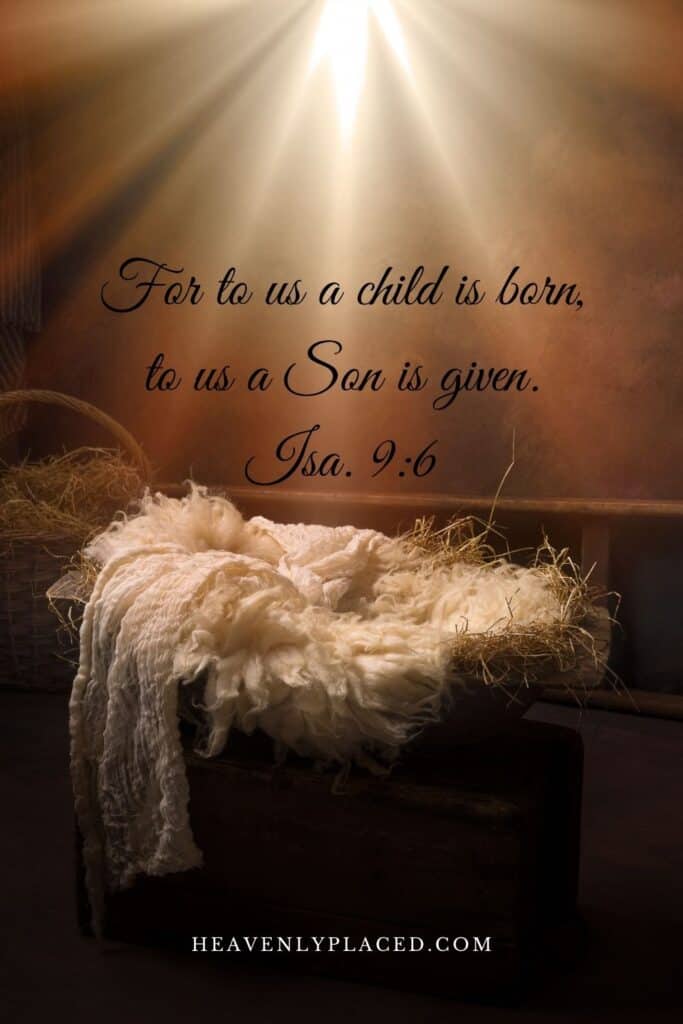Where Can I Find The Christmas Story In The Bible?
Let’s explore the Christmas story in the Bible and discover the true tale of the birth of Jesus as we dive into the biblical account of Christmas.
Some Christians take offense because the Christmas season is too commercialized or because others talk about Santa, and other cultures celebrate their holiday around the same time, citing that “Jesus is the reason for the season.” However, this holiday is not our own. We Christians share this holiday with others, like ancient Romans who celebrated their winter solstice at this time of year—Saturnalia. And with Santa Claus, who brings children’s toys in the middle of the night.
While we cherish the birth of Jesus Christ as the true meaning of Christmas, it may be beneficial to recognize the historical context and various traditions that have influenced this celebration over time. From the ancient Roman pagan festival of Saturnalia to the fourth-century establishment of December 25th as Christ’s birthdate and the incorporation of pagan practices into early Christmas customs, the holiday’s roots run deep in history–secular and sacred.
However, amidst the Christmas trees, carols, and festive decorations, our core message remains: the birth of Christ, the Son of God, the Prince of Peace, bringing good tidings of great joy and the promise of eternal life to all who believe.
So, as we embrace our family traditions and exchange Christmas cards and presents, let us also reflect on the true significance of our holiday, rejoicing in the birth of Jesus Christ, the Light of the World, and the perfect gift from our Almighty God.
This post may contain affiliate links. Read the full disclosure here.
The Birth of Jesus Is in the Bible
Although the time of Jesus’ birth is not mentioned in the Bible, theologians believe through historical events surrounding the birth described in the Bible that Jesus was not born on December 25. In Defender’s Study Bible, Dr. Hennry M. Morris clarifies this belief:
“A more probable time would be late September, the time of the annual Feast of Tabernacles, when such travel was commonly accepted. Thus, it is rather commonly believed (though not certain) that Jesus’ birth was around the last of September. The conception of Christ, however, may have taken place in late December of the previous year. Our Christmas celebration may well be recognized as an honored observation of the incarnation of ‘the Word made flesh’ (John 1:14).”
“…The probability is that this mighty angel, leading the heavenly host in their praises, was Michael the archangel; this occasion was later commemorated by the early church as Michaelmas (‘Michael sent’), on September 29, the same as the date of the Jewish Feast of Tabernacles. It would have at least been appropriate for Christ to have been born on such a date, for it was at His birth that ‘the Word was made flesh and dwelt (literally tabernacled) among us’ (John 1:14).
This would mean, then, that His conception took place in late December. Thus, it might well be that when we today celebrate Christ’s birth at what we call Christmas (i.e., ‘Christ sent’), we are actually celebrating His miraculous conception, the time when the Father sent the Son into the world, in the virgin’s womb.
This darkest time of the year—the time of the Saturnalia, and the time when the sun (the physical ‘light of the world’) is at its greatest distance from the Holy Land—would surely be an appropriate time for God to send the spiritual ‘light of the world’ into the world as the ‘Savior, which is Christ the Lord’ (Luke 2:11)” [Dr. Henry M. Morris, The Defender’s Study Bible (notes for Luke 2:8,13)].

Is it Biblical to Celebrate Christmas?
These are questions that many Christians ponder when it comes to celebrating Christmas. While the Bible doesn’t specifically mention the celebration of Christmas, it does emphasize the importance of celebrating the birth of Jesus, who came into the world as our Savior. The Bible encourages us to rejoice in the gift of Jesus and the hope He brings. As for Christmas trees and parties, they themselves are not inherently devilish or sinful. Instead, they can be seen as symbols of joy and togetherness, and gatherings with loved ones can be occasions of gratitude and fellowship.
However, it’s crucial for Christians to approach these traditions with a focus on the true meaning of Christmas and not let materialism or excess overshadow the spiritual significance of Christ’s birth. Family traditions can be cherished and meaningful, but they should align with biblical principles and values. Ultimately, the key is to celebrate Christmas in a way that brings honor to God, keeps Jesus at the center, and fosters love and goodwill among family and friends.
Hear the word that the Lord speaks to you, O house of Israel. Thus says the Lord: “Learn not the way of the nations, nor be dismayed at the signs of the heavens because the nations are dismayed at them, for the customs of the peoples are vanity. A tree from the forest is cut down and worked with an axe by the hands of a craftsman. They decorate it with silver and gold; they fasten it with hammer and nails so that it cannot move. Jeremiah 10:1-4

1st Recorded Christmas Celebration
The exact origins of the first recorded Christmas celebration remain unclear. Some suggest it could have started as early as 1 A.D., while others mention dates like 7 A.D., 270 A.D., or 320 A.D. What we do know is that in 336 A.D., the Roman Emperor Constantine, a Christian, officially sanctioned the celebration of Christ’s birth. His decree marked the beginning of the Christmas tradition, which has endured through the ages and across diverse cultures. This tradition, despite its mysterious origins, remains a powerful symbol of the deep importance of Jesus Christ’s birth, echoing the words of Isaiah 9:6,
“For to us a child is born, to us a son is given, and the government will be on his shoulders. And he will be called Wonderful Counselor, Mighty God, Everlasting Father, Prince of Peace.”

The Church Adopts the Celebration of Christmas
The early church did not celebrate Christ’s birth but rather His resurrection. This pivotal event, the cornerstone of Christian faith, was the central theme of their worship. However, as time went on, two theories emerged regarding the church’s adoption of Christmas as a celebration.
One theory suggests that early Christians calculated the holy conception of Jesus to have occurred sometime in March, ultimately leading to a birthdate in December. This calculation provided a meaningful reason to observe Christ’s birth during this time of the year.
Another theory revolves around the fact that various cultures and religions already observed festivities around the 25th of December, complete with decorations, festivals, gift-giving, lights, mistletoe, and yule logs. To either discourage Christians from participating in these pagan celebrations or to offer them an alternative reason to rejoice during this season, the church decided to adopt the celebration of Christ’s birth.
Among the confusion of these historical details, it’s worth remembering the words of Luke 2:11, which echo the heart of Christmas. This verse underscores the profound significance of Jesus’ birth, regardless of the date or the circumstances surrounding its celebration.
Today in the town of David a Savior has been born to you; he is the Messiah, the Lord. Luke 2:11 (NIV)
Is it Wrong to Say Merry Xmas or Happy Holidays?
A few years ago, it became politically incorrect to publicly wish others “Merry Christmas.” Fearing the word Christmas because Christ was in the middle of the word, store chains began requiring their associates to use the less specific greeting, “Happy Holidays,” to include other celebrations.
Christians took offense, and lines were drawn. Suddenly, saying Happy Holidays meant you weren’t faithful to the Savior, and saying Merry Christmas meant you were insensitive to others.
And then, hot on the heels of that debate, came the highly offensive greeting of Merry Xmas! Bumper stickers, t-shirt slogans, coffee mugs, and billboards sprung into the public limelight calling for “Christ to be put back into Christmas!”
Ironically, this debacle causes debate and division in a season of time when Christians should be celebrating the true reason for the holiday season Jesus’ birth and His purpose to bring peace to humankind.

So, is it wrong to say Happy Holidays, Merry Christmas, or Merry Xmas? The Bible is completely silent on this issue, which is where we find the issues we should stand on.
However, it may be worth noting that:
- Merry Christmas is a greeting that should be reserved for use between Christians. When you see a fellow brother or sister in Christ, of course, we should wish them a joyous celebration of Christ’s birth.
- Happy Holidays is inclusive and shouldn’t be a reason for offense. During this time of year, people celebrate Thanksgiving, Christmas, Hanukkah, Kwanza, and New Year, so it would be appropriate to wish someone you don’t know to be a Christian “Happy Holidays!”
- Merry Xmas is a Christian greeting, not an attempt to take Christ out of Christmas. R.C. Sproul, in his book “Now, That’s a Good Question!”, explains it like this.
“First of all, you have to understand that it is not the letter X that is put into Christmas. We see the English letter X there, but actually what it involves is the first letter of the Greek name for Christ. Christos is the New Testament Greek for Christ. The first letter of the Greek word Christos is transliterated into our alphabet as an X. That X has come through church history to be a shorthand symbol for the name of Christ.”
So, maybe as Christians, we should reconsider how strongly we want to stand against the tide we consider a threat to Christendom and be more accepting of others’ traditions. Give grace to others as they celebrate their family tradition on Christmas Day.
If possible, so far as it depends on you, live peaceably with all. Romans 12:18
Peace On Earth, Good Will Towards Men
The message delivered by the angels on the night of our Savior’s birth was a simple yet profound one. This message stirred the hearts of the humble shepherds, who wasted no time in finding the newborn baby lying in a manger. They eagerly shared the good news of God’s precious gift with others.
Glory to God in the highest, and on earth peace, good will toward men. Luke 2:14 (KJV)
As Christians, this message remains as relevant today as it did on that holy night. Jesus came into the world not for the righteous but to save sinners (1 Timothy 1:15). This is the heart of our faith – the promise of redemption and the extension of God’s goodwill towards all people. Just as the shepherds shared the joyous news of Christ’s birth, we, too, are called to proclaim the message of hope and salvation to the world, carrying forward the legacy of peace on earth and goodwill towards all.

25 Christmas Scriptures
The Christmas story runs all through the Bible.
Jesus, God’s only begotten Son, was sent to earth to bring peace between a sinful human race and a righteous holy God. The following verses tell of the prophecy before the birth, the birth, and the reason for Christ’s coming.
- Genesis 3:15 (ESV) I will put enmity between you and the woman, and between your offspring and her offspring; he shall bruise your head, and you shall bruise his heel.
- Isaiah 7:14 (ESV) Therefore the Lord himself will give you a sign. Behold, the virgin shall conceive and bear a son, and shall call his name Immanuel.
- Isaiah 9:6 (ESV) For to us a child is born, to us a son is given; and the government shall be upon his shoulder, and his name shall be called Wonderful Counselor, Mighty God, Everlasting Father, Prince of Peace.
- Isaiah 9:7 (NIV) “Of the greatness of his government and peace there will be no end. He will reign on David’s throne and over his kingdom, establishing and upholding it with justice and righteousness from that time on and forever. The zeal of the Lord Almighty will accomplish this.”
- Micah 5:2 (ESV) But you, O Bethlehem Ephrathah, who are too little to be among the clans of Judah, from you shall come forth for me one who is to be ruler in Israel, whose coming forth is from of old, from ancient days.
- Matthew 1:18-19 (NIV) “This is how the birth of Jesus the Messiah came about: His mother Mary was pledged to be married to Joseph, but before they came together, she was found to be pregnant through the Holy Spirit. Because Joseph her husband was faithful to the law and yet did not want to expose her to public disgrace, he had in mind to divorce her quietly.”
- Matthew 1:20 (NIV) “But after he had considered this, an angel of the Lord appeared to him in a dream and said, ‘Joseph son of David, do not be afraid to take Mary home as your wife, because what is conceived in her is from the Holy Spirit.'”
- Matthew 1:21 (NIV) She will give birth to a son, and you are to give him the name Jesus, because he will save his people from their sins.”
- Matthew 1:24-25 (NIV) “When Joseph woke up, he did what the angel of the Lord had commanded him and took Mary home as his wife. But he did not consummate their marriage until she gave birth to a son. And he gave him the name Jesus.”
- Matthew 2:1-2 (ESV) Now after Jesus was born in Bethlehem of Judea in the days of Herod the king, behold, wise men from the east came to Jerusalem, saying, “Where is he who has been born king of the Jews? For we saw his star when it rose and have come to worship him.”
- Luke 1:26-28 (NIV) In the sixth month of Elizabeth’s pregnancy, God sent the angel Gabriel to Nazareth, a town in Galilee, to a virgin pledged to be married to a man named Joseph, a descendant of David. The virgin’s name was Mary. The angel went to her and said, “Greetings, you who are highly favored! The Lord is with you.”
- Luke 1:31-32 (NIV) The angel said to her, “Do not be afraid, Mary; you have found favor with God. You will conceive and give birth to a son, and you are to call him Jesus. He will be great and will be called the Son of the Most High. The Lord God will give him the throne of his father David.
- Luke 2:4-5 (NIV) So Joseph also went up from the town of Nazareth in Galilee to Judea, to Bethlehem the town of David, because he belonged to the house and line of David. He went there to register with Mary, who was pledged to be married to him and was expecting a child.
- Luke 2:6-7 (ESV) And while they were there, the time came for her to give birth. And she gave birth to her firstborn son and wrapped him in swaddling cloths and laid him in a manger, because there was no place for them in the inn.
- Luke 2:8-9 (NIV) And there were shepherds living out in the fields nearby, keeping watch over their flocks at night. An angel of the Lord appeared to them, and the glory of the Lord shone around them, and they were terrified. But the angel said to them, “Do not be afraid. I bring you good news that will cause great joy for all the people.
- Luke 2:11 (ESV) For unto you is born this day in the city of David a Savior, who is Christ the Lord.
- Luke 2:12 (NIV) “This will be a sign to you: You will find a baby wrapped in cloths and lying in a manger.”
- Luke 2:13-14 (ESV) And suddenly there was with the angel a multitude of the heavenly host praising God and saying, “Glory to God in the highest, and on earth peace among those with whom he is pleased!”
- Luke 2:15 (NIV) When the angels had left them and gone into heaven, the shepherds said to one another, “Let’s go to Bethlehem and see this thing that has happened, which the Lord has told us about.”
- Luke 2:20 (ESV) And the shepherds returned, glorifying and praising God for all they had heard and seen, as it had been told them.
- Luke 2:25 (ESV) Now there was a man in Jerusalem, whose name was Simeon, and this man was righteous and devout, waiting for the consolation of Israel, and the Holy Spirit was upon him.
- John 1:14 (ESV) And the Word became flesh and dwelt among us, and we have seen his glory, glory as of the only Son from the Father, full of grace and truth.
- John 3:16 (NKJV) For God so loved the world that He gave His only begotten Son, that whoever believes in Him should not perish but have everlasting life.
- Galatians 4:4-5 (ESV) But when the fullness of time had come, God sent forth his Son, born of woman, born under the law, to redeem those who were under the law, so that we might receive adoption as sons.
- Colossians 2:16-17 (NIV) “Therefore do not let anyone judge you by what you eat or drink, or with regard to a religious festival, a New Moon celebration or a Sabbath day. These are a shadow of the things that were to come; the reality, however, is found in Christ.”
Please Share This Article
Christmas Books

Comfort Beside Still Waters is a devotional for those going through a difficult time or seeking direction. This guided journal will lead the reader into 31 days of Bible reading, thoughtful questions, and prayer. A thoughtful gift for someone going through times of uncertainty, grief, or prolonged illness.
Order your copy on Amazon.









